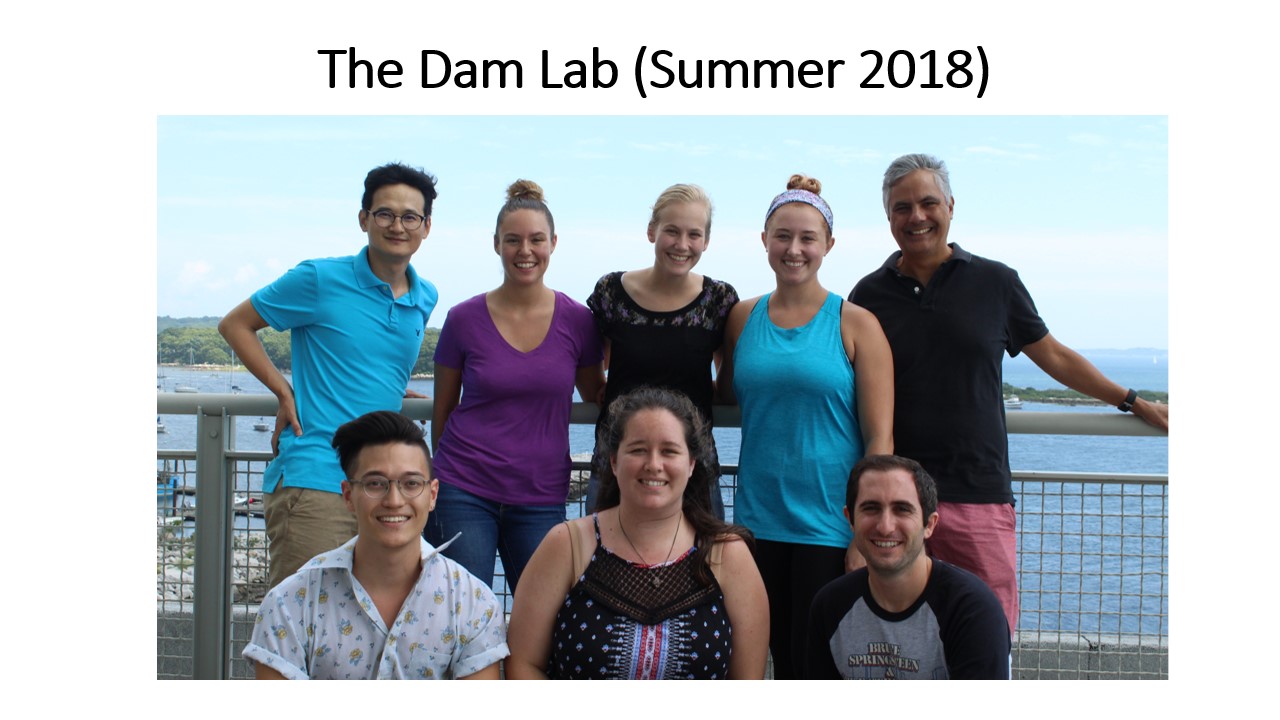Hans G. Dam
(Ph.D., SUNY Stony Brook) Professor of Marine Sciences
I am a biological oceanographer. My research interests are in the biology, ecology and evolution of planktonic organisms, particularly pelagic copepods and toxic dinoflagellates. Earlier in my career, I investigated questions dealing with the role of planktonic organisms on biogeochemical cycles in the ocean and the formation and fate of marine aggregates. Currently, my interests deal with questions of the evolutionary ecology of plankton, particularly zooplankton adaptation to ocean warming and acidification, and reciprocal interactions between zooplankton and toxic dinoflagellates
My proudest professional achievement is the training of some excellent graduate students. I encourage my students to become critical thinkers, to work on important questions in the field, and to publish their work in a timely manner.
For news about my lab’s activities, visit our Facebook page or our Twitter feed
Interaction of Grazers and Toxic Algae. Toxic algal blooms are proliferating worldwide, but we understand little of the consequences of such proliferation. We are currently interested in the evolution of grazer adaptation to phytoplankton neurotoxins produced by the dinoflagellate Alexandrium. We have experimentally demonstrated that populations of grazers that experience frequent blooms of toxic Alexandrium have a fitness advantage over those populations that do not frequently experience such blooms. We have developed methods to identify phenotypes of adaptation to toxic algae and measured fitness costs and advantages of toxin adaptation. We are also actively working on the molecular mechanisms of grazer adaptation to the toxins produced by Alexandrium. New areas of research in the lab are: 1) Novel mechanisms of toxicity (reactive oxygen species) in Alexandrium. 2) Costs and advantages of toxin production in Alexandrium. 3) Grazer-induced toxicity in Alexandrium.
Recent Research Grants
Linking eco-evolutionary dynamics of thermal adaptation and grazing in copepods from highly seasonal environments. National Science Foundation.
ECOHAB 2017: Are growth and toxicity of the dinoflagellate Alexandrium controlled by grazer-induced defense? ECOHAB program, NOAA.
Transgenerational phenotypic and genomic responses of marine copepods to the interactive effects of temperature and CO2. National Science Foundation.
Response of zooplankton to projected changes in temperature in Long Island Sound – NOAA, CT Sea Grant Program
Chemical defenses in a toxic dinoflagellate: Mechanisms and constraints – National Science Foundation
Monitoring mesozooplankton and microzooplankton in Long Island Sound. – Environmental Protection Agency/CT DEEP
Current Students & Postdocs
Ewaldo Leitao – Ph.D. Student
Mathew Holmes-Hackerd -M.S. Student
Mikayla Baer – Ph.D. Student
Gihong Park – Postdoc
Matthew Sasaki – Postdoc
Former Students (alphabetically)
Christina Batoh – Ph.D. 2012
Zair Burris – Ph.D. 2014
Mari Butler – M.S. 1993
Lihua Chen – Ph.D. 2010
Sean Colin – Ph.D. 2002
Ben Cournoyer – M.S. 2013
James deMayo – Ph.D. 2021
David Detlor – M.Sc. 1998
Leah Feinberg – M.S. 1998
Michael Finiguerra – Ph.D. 2013
Michael Ford – M.Sc 2000
Sheean Haley – M.S. 2002
Caroline A. Loglisci – M.S. 2007
Gihong Park – Ph.D. 2018
Kimberly Philips – M.S. 1996
Matthew Sasaki – Ph.D. 2020
Amy Smith Siuda – Ph.D. 2007
Kam Tang – Ph.D. 2000
Xinsheng Zhang – Ph.D. 1997
Research Staff
Courses Taught
Undergraduate Courses:
Honors Received
Fellow, American Association for the Advancement of Science (2015)
Sustaining Fellow, Association for the Sciences of Limnology and Oceanography (2016)
Member of the Connecticut Academy of Arts and Sciences (2009)
Member of the Connecticut Academy of Science and Engineering (2007)
National Science Foundation Ocean Sciences CAREER award (1995)
Augmentation award for science and engineering training (AASERT) from the Office of Naval Research (1994)
Recent Representative Publications
Click here to see my publication record (Googgle Scholar)
Click here to download my papers on Research Gate
Dam, H.G. et al. 2021. Rapid, but limited, adaptation of marine zooplankton
to simultaneous warming and acidification. Nature Climate Change. 11: 780–786
Sasaki, M. and H.G. Dam. 2019. Integrating patterns of thermal tolerance and phenotypic plasticity with population genetics to improve understanding of vulnerability to warming in a widespread copepod. Global Change Biology. 25(12): 4147-4164.

| hans.dam@uconn.edu | |
| Phone | 860-405-9098 |
| Fax | 860-405-9153 |
